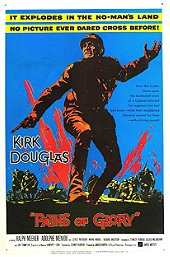Colonel Dax: "Because you don't know the answer to that question, I pity you."
The bitter, numbing inanity of war and the exploitation of military ranks is made brazenly obvious in Stanley Kubrick's Paths of Glory. Vehemently an anti-war feature, this compelling masterpiece is a piercing attack on the military hierarchy, and a film that proved so controversial it was banned in France until 1975 and unreleased in Spain under Franco's rule.
This was Kubrick's fourth feature film (previously he'd directed 1953's Fear and Desire, 1955's Killer Kiss, and 1956's The Killing), but this blistering indictment of military politics made a name for the young director. What's so startling - and impressive - about Kubrick's storytelling in Paths of Glory is the cold, matter-of-fact manner in which the film unfolds. As the anti-war statement develops, all rage and dismay becomes targeted at war itself instead of individuals. The product is an unforgettable, enthralling landmark war movie; a significant lesson in humanity and social incompetence. Decades later the power and intensity of the film still resonates.
Paths of Glory explores the whole spectrum of misguided personalities at times of war. The setting is 1916, during the latter period of World War II. The French and German armies are dug into trenches in a hopeless stalemate. The impatient French General Staff pass an order to take a strategic German hill known as the "Anthill". This would be an obvious suicidal charge, yet the Generals are all-too-willing to risk the lives of their soldiers. A reluctant Colonel Dax (Douglas) is handed the assignment. Despite the knowledge that possibly 60% of his soldiers will die, he has little choice. As Dax leads his men, the chaos and mayhem results in the soldiers becoming pinned down in dangerous territory. The mission is an utter failure. The furious generals are embarrassed about the defeat, and cover up their abject blunder by selecting scapegoats: three soldiers from Dax's regiment who'll be court marshalled for cowardice under fire and made an example of.
Inspired by Humphrey Cobb's book as well as a string of real newspaper articles, Stanley Kubrick's 87-minute Paths of Glory briskly moves from a misconceived attack to the courtroom trial following it. The powerful Generals depicted in the film are merely corrupt, self-centred marionettes strung up to participate in a game of profligacy and opportunism at the most inappropriate of times. In the somewhat short but gripping attack sequence, Kubrick manages to portray the carnage and the horrors of war in a succession of remarkable images that set the stage for the events to follow. The film views war in terms of power. Those higher up in the ranks have the power to simply court marshal any random soldier. How can any man who isn't standing side-by-side with these men at the front lines possess the arrogance to accuse them of cowardice? As the story unfolds, this question is literally screaming at the viewer. The truth of the matter is on the screen for all to see, yet the Generals play the ignorance card. All we can hope is that sanity will somehow prevail. The underlying subtext concerns the abuse of power and the consequences of not standing against it.
Paths of Glory is astonishingly photographed. The captivating black and white imagery makes this one of the most memorable and authentic-looking anti-war films in the history of cinema. Even during the early days of his career, Stanley Kubrick's camera movements are graceful and masterful. The courtroom scene is particularly stunning and admirably unconventional. Whenever we expect Kirk Douglas to deliver an amazing, long, inspirational speech, the Generals counter these possibilities. At 87 minutes, the film is extremely concise and to the point. By circumventing the clichés and challenging an audience's expectation of a happy ending, the film is all the more devastating and compelling.
There's an assortment of top-notch performances from head to toe. Kirk Douglas is brilliant as Colonel Dax. He's the only high-ranking character in the film with a hint of veracity. As the Generals defy respect for human life with their orders, Dax stands up to them. Even when offered a promotion he bluntly refuses in a series of insults. Douglas is energetic and charismatic. It is his wisdom, sincerity and determination that make the intolerable injustice we witness so despicable. In Douglas' Dax we see all the qualities of a true hero without glorifying the character in any way.
George Macready is outstanding as the pompous, twisted, fictional French commander General Paul Mireau who possesses not an ounce of sympathy for his embattled troops. In the face of a shell-shocked soldier he offers nothing but blunt insults and orders to have the man removed from the regiment. His character also wilfully orders a suicide mission, and then in embarrassment he perversely finds a scapegoat to use in order to direct the blame away from him. Macready is authoritative and, frankly, quite terrifying.
There is only one single flaw in the film which unfortunately reverberates to other areas: lack of French accents. Soldiers are of different accents, such as American. It destroys one aspect of the film's authenticity. The fact that the soldiers are supposedly French is therefore only evident in the dialogue mentioning it.
Overall, Paths of Glory is a timeless and compelling masterpiece, and certainly one of Stanley Kubrick's best movies. Anti-war films of this calibre are few and far between in this current age of cinema. Unfortunately, this is a film seen by relatively few. It even missed out on a spot on the AFI Top 100! Classics are far too unfairly overlooked in this day and age. With a brilliant ensemble cast, enthralling cinematography and an effective script, Paths of Glory is an outstanding essay on the madness of conflict, both in war and in politics. The terse and remorseless final flourish is one of the most emotionally devastating endings in Kubrick's career. You won't soon forget it.
8.9/10
 Login
Login